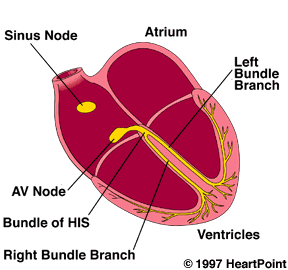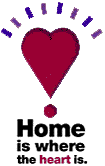What are the symptoms of
arrhythmias?
There may be no symptoms at all. At other times, a
very slow rhythm may cause the patient to become lightheaded or to pass out
("syncope"). There is more about this later in this section. Patients may
experience symptoms of congestive heart failure with shortness of breath, swelling of the
ankles, and other symptoms. In the case of a very rapid rhythm, the same symptoms may
occur because at high rates, the pumping chambers don't have the chance to fill
adequately.
By far the most common symptom of arrhythmias is
"palpitations", the awareness of the heartbeat. Under some circumstances, people
are aware of their heart beat when it is beating normally. It can often be felt when the
electrical system is working just fine, but the heart muscle is simply beating hard enough
to be felt in the chest, upper abdomen or other areas. Interestingly, it is not entirely
uncommon for rumblings from the stomach or twitches from muscles in the chest wall to be
misinterpreted as coming from the heart.
Palpitations coming from irregular rhythms are often
described in several ways:
- "A skip" is the sensation people often
report when a beat occurs early. There is little time for filling, and little blood is
ejected from the heart.
- A "pause" or "it stops!" is also
a frequent description. The mechanism is often exactly the same as for the skip. In this
case however, the patient is aware of the pause rather than the early beat. This often is
accompanied by a resounding "thump" when the next beat occurs, a result of extra
blood being ejected which had filled the heart chamber during the pause.
- Multiple skips can also occur, which may be regular
or irregular in their rhythm.
It is virtually impossible to make a specific
diagnosis of the mechanism of an arrhythmia from the type of palpitations it produces.
Even more confusing sometimes is the fact that a patient may be having more than one type
of arrhythmia, and it all feels pretty much the same to them.
How do I tell what kind of arrhythmia is occurring?
Most of the time you can't tell on your own. The
electrocardiogram will tell the story, and be able to show the electrical mechanism of the
arrhythmia. Of course, the arrhythmia has to occur during the time the ECG is being
recorded to evaluate it. Trouble is, just like your car at the mechanic's, you can't
always get that arrhythmia to perform "on cue". For this reason, there are
several devices which are used to try and catch the culprit:
- Holter monitors have been in use for many years.
Several leads are placed on the chest and connected to the device which is worn on the
belt which will record every single beat that occurs while it is on. The results are
"scanned", nowadays usually with the aid of a computer under a technician's
guidance, and printed on paper for review. The advantage of this technique is that every
beat is recorded, even irregular rhythms that the patient is not aware of. The
disadvantage is that the device is typically only worn for 24 to usually no more than 48
hours. Many patients will not have their symptoms during the recording.
- "Heart cards" are credit card-sized devices
which can be carried around with the patient, but don't require leads to be hooked up.
Recordings can be made simply by placing the device on the bare skin of the chest - the
recording electrodes are on the little card itself. A button is pushed, and the heartbeat
occurring at that time is recorded. A phone number is then called, the device placed over
the speaker of the phone, and another button is pushed. This sends a sound out over the
telephone line, which is then translated on the other end into an electrocardiographic
recording. These are great devices for people who have symptoms that last a little while
(long enough to get the device out and press the button).
- "Event monitors" have similarities to both
holter monitors and heart cards. For these devices, leads are worn most all of the time.
In this case, heartbeats are continuously recorded, although there is only room for about
5 minutes worth. The beats which occurred over 5 minutes are "lost" or
"forgotten" to make room for the new beats. When an event occurs, the button is
pushed at the first available moment. This can be very valuable for people who have very
brief symptoms, or those who experience a loss or diminution of consciousness for whom the
heart card would not be useful (since the arrhythmia probably would have passed by the
time they were able to place the heart card on the chest).
Electrophysiologic studies (EPS) is another form of
testing which can be utilized in certain circumstances where the results of the above
tests are unrevealing. These studies are performed in the hospital. Patients are brought
to a suite similar to a heart cath lab. Catheters are inserted in veins and/or arteries
and advanced to the heart where very precise recordings of the electrical activity can be
obtained. In some cases, catheters are also used to stimulate the electrical system to see
if abnormal beats can be "induced".
What are some general causes of arrhythmias and
palpitations?
- They may not be associated with any significant
abnormality
- Stress is not an uncommon associated condition. This
may be subtle and overlooked. Sometimes however, patients with serious arrhythmias
convince themselves "it's just stress" when in fact there is in fact another
more important condition.
- Lack of sleep.
- It is very common for stimulants to cause
palpitations, even those stimulants which are socially acceptable such as caffeine which
is found in coffee, tea (hot or iced), and many carbonated beverages. Caffeine is also
found in over-the-counter medications including some pain relievers and agents sold to
prevent drowsiness.
- Nicotine and other stimulants and toxins in
cigarettes, cigars, snuff and other tobacco products.
- Chocolate contains significant amounts of stimulants.
- Alcohol can be associated with palpitations and
arrhythmias, some of them serious.
- Over the counter medications, particularly those
containing "decongestants".
- Medical conditions such as increased thyroid.
- Abnormalities of electrolytes, such as potassium or
magnesium which are more common if a person is taking medicines such as diuretics (water
pills).
- Some medications
- Essentially any heart condition
Is there anything I can do
to make palpitations better?
See your physician if they are persistent or
accompanied by other symptoms as noted below. Regardless of the cause, there are certain
things you can do that will make a difference.
- Good "health hygiene" is important. Address
stress, get enough sleep, follow a good exercise program (as outlined by your physician).
- Avoid the stimulants noted above.
- Examine any over-the-counter medications you may be
taking.
- Keep track of your symptoms . . . see if you can find
a pattern.
- Don't self-diagnose.
When should I worry about palpitations?
Palpitations are very common in the general
population. They are also generally "benign", and do not require specific
investigations or therapy if they are infrequent and not associated with any other
symptoms.
Certain other things should lead you to consider
further evaluation:
- If you suffer lightheadedness or pass out in
association with palpitations, this implies that you are not providing enough output from
your heart. This should definitely be evaluated.
- Likewise, if you suffer shortness of breath or if you
have pains in your chest, neck, shoulders, arms or back in association with the
palpitations.
- If these occur with the initiation of a new
medication.
- If palpitations occur with other symptoms, such as
significant weight loss, or you are otherwise feeling ill over a period of time.
- Are accompanied by headaches and sweating.
Also see these related topics:
Arrhythmias - Introduction
Arrhythmias - Specific
Pacemakers
Atrial fibrillation
Ventricular arrhythmias
©COPY;1997 HeartPoint Updated
October 1997
This site presents material for your information, education and entertainment.
We can assume no liability for inaccuracies, errors, or omissions. Above all, material on
this site should not take the place of the care you receive from a personal physician. It
is simply designed to help in the understanding of the heart and heart disease, and not as
a diagnostic or therapeutic aid. You should seek prompt medical care for any specific
health issues. Please feel free to browse the site and download material for personal and
non-commercial use. You may not however distribute, modify, transmit or reuse any of these
materials for public or commercial use. You should assume that all contents of the site
are copyrighted. ©COPY;1997 HeartPoint

